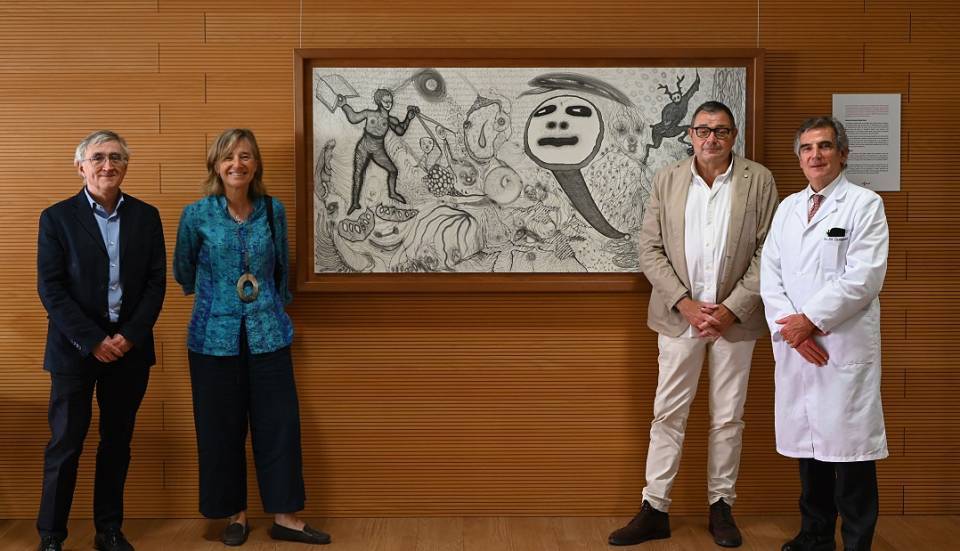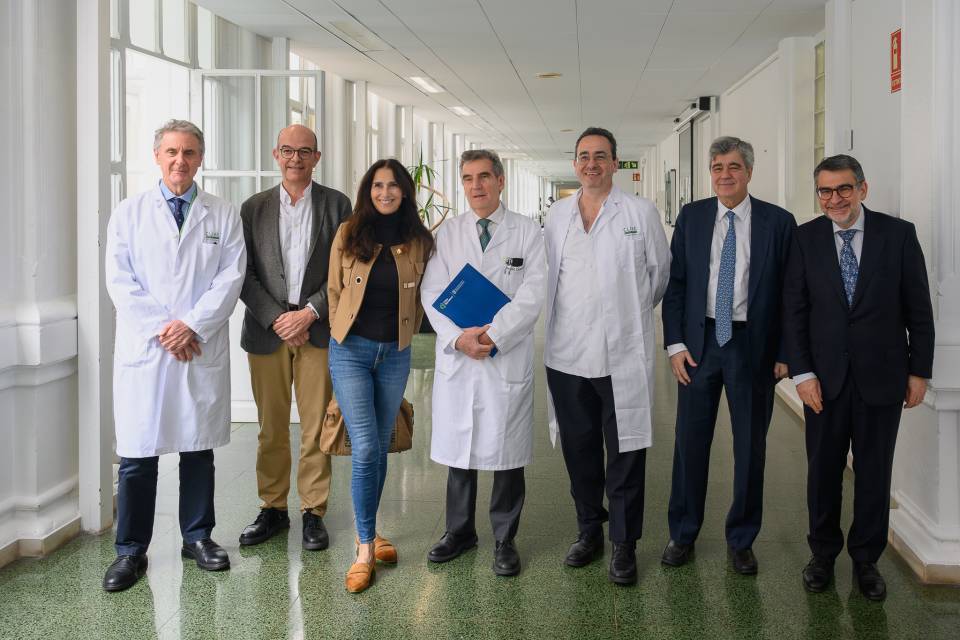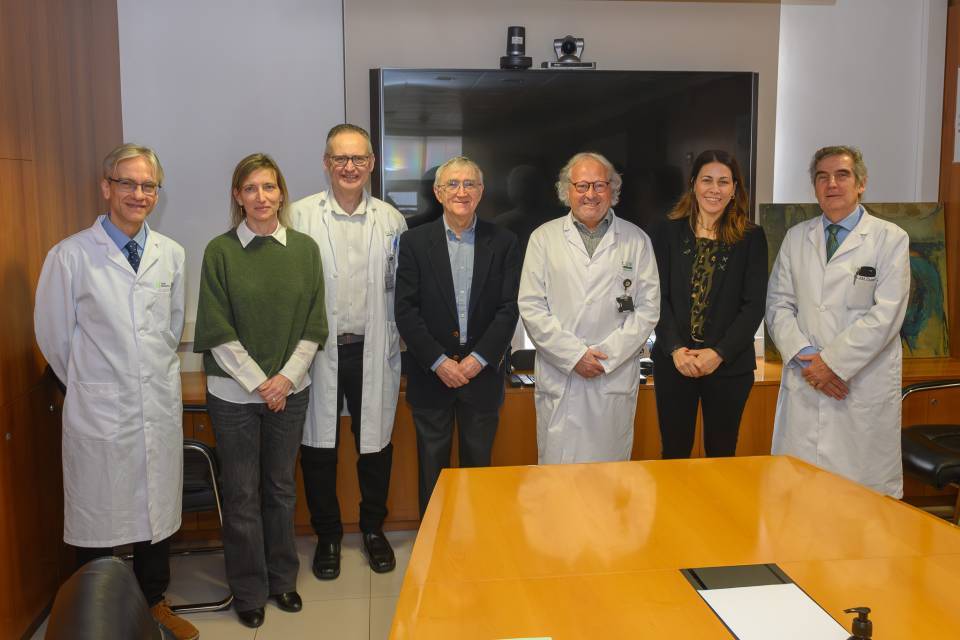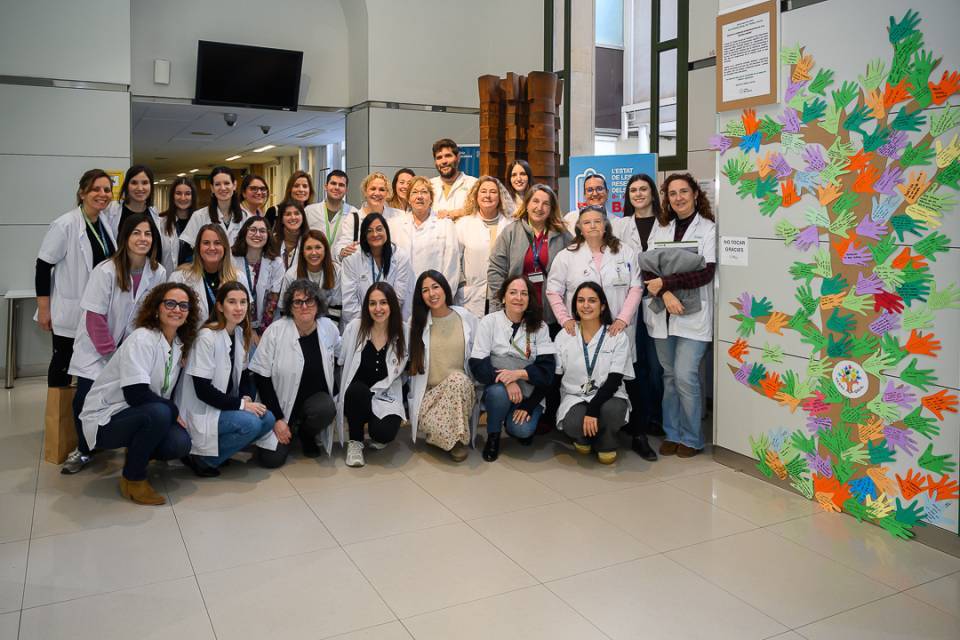Clínic Barcelona-IDIBAPS, the Suñol Foundation and the Glòria Soler Foundation have established an alliance to promote Art & Science, a project aimed at generating social impact through the union of both disciplines. Elías Campo, director of IDIBAPS, Josep Maria Campistol, CEO of Clínic Barcelona, Rodrigo Navia-Osorio, president of the Suñol Foundation, and Sílvia Noguer, executive director and patron of the Glòria Soler Foundation, signed the cooperation agreement, which will have an initial duration of two years, on Monday, May 8.
The objective of the project is to implement a series of artistic interventions aimed at bringing art into the field of research. Art and science are two complementary ways of exploring the world. However, even though both artists and researchers are driven by curiosity and creativity, they are often treated as two disciplines that are separate and even at odds with one another. Now, however, this cooperation between Clínic Barcelona-IDIBAPS, the Suñol Foundation and the Glòria Soler Foundation will attempt to break down stereotypes and show that science provides the basis for many artistic works, and that contemplating and understanding the beauty of our environment can stimulate scientific activity.

According to IDIBAPS director Elías Campo, “This project provides a perfect opportunity to position Clínic Barcelona-IDIBAPS as a campus of reference, not only in research, but also in the promotion of culture and art. Science is associated with reason and technicality, but it is creative thinking, interpretation, imagination and innovation that enable us to find solutions to the problems we face”. This vision is wholly shared by Josep Maria Campistol, CEO of Clínic Barcelona: “The creation of a cultural space within the Campus research environment is something truly wonderful, a pleasure and a privilege. Art is not only for leisure, but can also be therapeutic and contribute to the wellbeing and recovery of patients”.
In his comments, Rodrigo Navia-Osorio said:“We are delighted that people can enjoy works from the Suñol Soler Collectionat research and healthcare centres like IDIBAPS and Clínic Barcelona”. Finally, Sílvia Noguer notes that: “Art and science are two disciplines with much in common, and the workTrodotz (1989-1990) by Zush, who defines himself as ArtCienMist – artist, scientist and mystic – is a fine illustration of the affinities between them”.
The first action under the new agreement is the loan of the work Trodotz by the artist Zush/Evru (Barcelona, 1946). The piece, installed in the lobby of the Esteve Auditorium at IDIBAPS headquarters in the Esther Koplowitz Center on April 11, will be replaced in October 2023 by the work Untitled, by Eva Lootz (Vienna, 1940). Parallel to the exhibition Zush in Ibiza, open to the public at the Suñol Foundation until May 20, a series of activities have also been planned to enable researchers to view the artist's work and complete the link between art and science.
A long history of cooperation
The Glòria Soler Foundation has a long history of cooperation with Clínic Barcelona-IDIBAPS, having helped to fund to research projects with great societal impact: ARI and COVIDBANK.
CAR-T (chimeric antigen receptor) is a type of cell and gene therapy in which the patient themselves becomes the donor. In it, the patient's T lymphocytes are modified to give them the capacity to attack cancer cells. The ARI project was established to raise funds for the development of CAR-T therapy at Clínic Barcelona. And the cooperation of the Glòria Soler Foundation was crucial for enabling clinical trials to begin with the first patients and – with the help of other donations –making this treatment available on the Spanish public health system. In February 2021, the Spanish Agency for Medicines and Medical Devices (AEMPS) approved the use of CAR-T ARI 0001 in patients over 25 years of age with lymphoblastic leukaemia resistant to conventional treatments.

The scientific community reacted swiftly to the unexpected outbreak of the SARS-Cov-2 coronavirus pandemic, which causes the COVID-19 disease, addressing the clinical, biological and epidemiological issues that arose from the emergency. The contribution of the Glòria Soler Foundation was key for establishing and consolidating the IDIBAPS COVIDBANK, a bank of biological samples from COVID-19 patients admitted to the Hospital Clínic Barcelona for research into the disease. At present, the COVIDBANK conserves 7,834 blood, plasma, DNA and serum samples.




